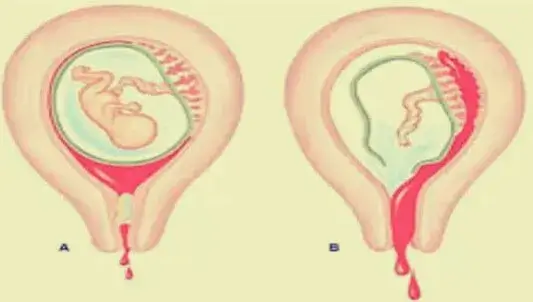The short answer is no. Despite all of the claims out there, it isn’t possible to have a period while you’re pregnant.
Rather, you might experience “spotting” during early pregnancy, which is usually light pink or dark brown in color.
As a rule of thumb, if there’s enough bleeding to fill a pad or tampon, then it’s a sign you’re probably not pregnant. If you’ve had a positive pregnancy test and are bleeding heavily, seek medical care.
RELATED: Cramps but No Period: Early Pregnancy Symptoms
Period vs. pregnancy
Your period occurs every month or so in lieu of an egg becoming fertilized. Eggs are released once a month from the ovary. When they aren’t fertilized, the egg travels out of the uterus and sheds through the vagina.
Bleeding during a “normal” period often starts off light, then gets heavier and darker red. It also lightens in color and quantity toward the end of the cycle.
The differences between menstruation and being pregnant are supposed to be clear-cut: Once you’re pregnant, you don’t get periods anymore. But it isn’t always so obvious.
Some people claim they’ve gotten periods while pregnant. Fueling some of the inquiries in the “periods while pregnant” conspiracy is social media, blogs, and even television shows like “I Didn’t Know I Was Pregnant.”
Bleeding is a warning sign, but it doesn’t have to be something bad. Many people go on to have healthy babies after experiencing spotting during their first trimester. If you do bleed during pregnancy, it’s related to something else other than regular menstruation.
After all, periods only happen when you’re not pregnant. Learn about the different types of bleeding during pregnancy and when you need to call your OB-GYN.
Causes of bleeding during the first trimester
Between 15 and 25 percent of people spot during early pregnancy. Some of the causes are:
- implantation bleeding
- changes in the cervix
- infection
- molar pregnancy (abnormal mass fertilizes instead of a fetus)
- ectopic pregnancy (a pregnancy outside of the uterus)
- early signs of a miscarriage
RELATED: Weird Early Pregnancy Symptoms No One Tells You About
Implantation bleeding
This happens in the earliest stages of pregnancy. At this point, you likely haven’t gotten a pregnancy test yet. This type of bleeding occurs when the fertilized egg implants into the uterus, usually around the time your period would be expected.
Implantation bleeding is sometimes mistaken as a period, though the bleeding is usually light or just spotting.
Shortly after pregnancy, you might also experience spotting from cervical changes. Unless there’s an infection, this isn’t often causing concern.
Other causes
Other types of early bleeding that can indicate an emergency medical issue include:
- infections
- ectopic pregnancy
- molar pregnancy
- miscarriage
These can also be accompanied by:
- severe cramps or abdominal pain
- back pain
- faintness or losing consciousness
- fatigue
- shoulder pain
- fever
- vaginal discharge changes
- uncontrollable nausea and vomiting
The bleeding is also much heavier, unlike spotting. It’s more like a normal period.
Causes of bleeding during second and third trimesters
Bleeding beyond the first trimester often requires medical attention. Regardless of whether bleeding during the second and third trimesters is light or heavy, with or without any other symptoms, you need to call your doctor for an emergency visit.
Common causes of bleeding during the rest of pregnancy include:
- term or preterm labor or cervical dilation
- miscarriage
- placenta previa
- placental abruption
- uterine rupture (rare)
- vasa previa (rare)
RELATED: Causes for a False-Positive Pregnancy Test
Preterm labor
This refers to any birth that happens before 37 weeks. Before preterm labor, some people experience symptoms similar to a period as well as a large amount of mucus discharge.
While cramping may also be felt, preterm labor also causes contractions. Symptoms of preterm labor might also include:
- backache
- a sensation of pressure in the vagina
- changes in discharge
Placenta previa
This happens when the placenta is implanted low in the uterus and very close to, or covers, the cervix. The bleeding varies, but there are no other symptoms. Placenta previa can hinder labor and delivery.
Placental abruption
This occurs most commonly during the last few months of pregnancy. The placenta detaches from the uterus, usually causing heavy bleeding and possibly severe stomach pain and cramping. Certain health conditions, such as high blood pressure, can increase the risk of placental abruption.
Uterine rupture
A uterine rupture means that the muscle of the uterus separates or tears. This can cause uncontrolled bleeding. It occurs most commonly in those who have delivered via cesarean delivery in the past. Though rare, this type of tear happens on old scar lines along the uterus.
Many of the conditions that happen in the latter part of pregnancy cause bleeding and other symptoms similar to a period. These aren’t really menstruation, though.
RELATED: Urinating before and after sex: Here’s why it is good for you
Bottom line
It’s not possible to get your period while pregnant. You may, however, experience similar symptoms of a period during the first trimester. These include:
- vaginal bleeding (light and short-term)
- light cramping
- fatigue
- irritability
- lower back pain
The difference is that these symptoms are related to your body’s natural preparation methods for pregnancy. If any of the above symptoms are severe or don’t go away, you’re in the second or third trimester of pregnancy, or both apply, seek immediate care.
Sometimes it’s difficult to tell whether bleeding is indicative of a medical emergency or not. As a rule of thumb, if you’re bleeding at any stage of pregnancy, call your doctor right away.

